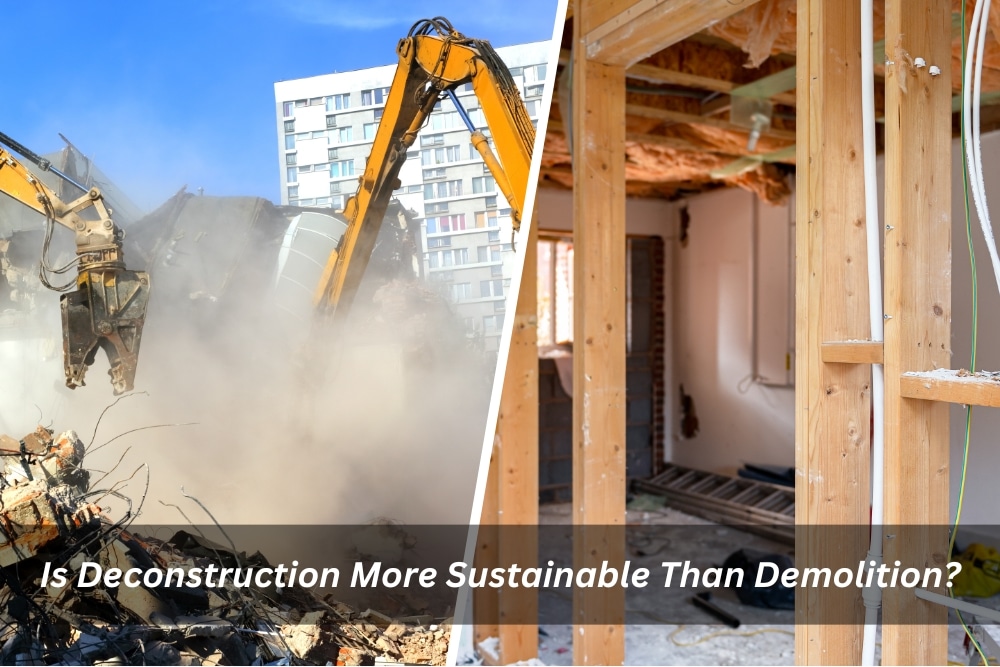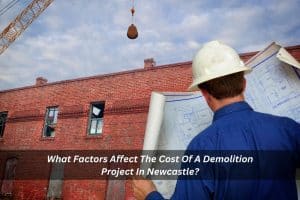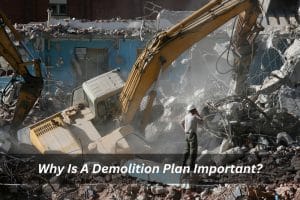Planning a project that involves altering a building? Whether it’s a complete overhaul or a targeted renovation, the question of how to handle the existing structure arises. And in today’s environmentally conscious world, the answer isn’t as simple as swinging a wrecking ball. Enter the debate: deconstruction vs. demolition.
Facing a building makeover? Demolition vs. Deconstruction: Which way to go?
Imagine your building needs a makeover – perhaps a complete overhaul, a trendy interior refresh, or an expansion to match your growing needs. But before the exciting part, a crucial decision looms: how to handle the existing structure. Traditionally, demolition might seem like the obvious answer – swing the wrecking ball and start fresh. However, in today’s eco-conscious world, a more sustainable alternative is gaining traction: deconstruction.
Demolition
Demolition is the classic method – think towering machines, dust clouds, and a mountain of debris trucked off to landfills. While it’s fast and efficient, the environmental footprint is undeniable:
Pros:
- Fast and efficient: Demolition gets the job done quickly, minimising disruption and allowing for a speedy start to the new project.
- Lower upfront costs: The initial cost of demolition is often lower than deconstruction due to the streamlined process.
- Suitable for certain projects: For large-scale demolitions or projects requiring complete removal of existing structures, demolition might be the only viable option.
Cons:
- Significant environmental impact: Demolition sends tons of debris to landfills, contributing to resource depletion and greenhouse gas emissions.
- Loss of valuable materials: Usable materials like lumber, brick, and fixtures are discarded, leading to unnecessary waste and missed opportunities for reuse.
- Limited community and cultural benefits: Demolition offers few opportunities for local businesses or cultural preservation.
Deconstruction
Deconstruction takes a different approach. Instead of brute force, it involves meticulously dismantling the building, and carefully salvaging usable materials:
Pros:
- Minimises environmental impact: Deconstruction diverts materials from landfills, conserves resources, and reduces greenhouse gas emissions.
- Preserves valuable materials: Salvaged materials can be reused in new projects, repurposed for creative endeavours, or sold, generating potential income. Furthermore, read more about maximising material reuse in our blog: ‘How to reduce waste and maximise reuse in demolitions?‘
- Boosts local economy and community: Deconstruction creates jobs in salvaging, restoration, and upcycling, benefiting local businesses.
- Preserves historical and cultural value: Deconstruction safeguards architectural elements and materials with historical significance.
- Unique aesthetic possibilities: Repurposed materials add character and individuality to new projects, promoting sustainable design and craftsmanship.
Cons:
- Higher upfront costs: The labour-intensive nature of deconstruction can lead to higher initial costs compared to demolition.
- Longer project timelines: Deconstruction takes more time than demolition, potentially delaying the start of the new project.
- Requires careful planning and expertise: Finding qualified deconstruction contractors and navigating permitting processes can add complexity.
Can deconstruction save you money? Exploring the cost comparison
While deconstruction often involves higher labour costs due to meticulous dismantling, the financial benefits can be surprising:
- Material Sales: Salvaged materials, especially high-quality elements like vintage wood or architectural features, have resale value, offsetting some costs.
- Tax Incentives: Many regions offer tax breaks for deconstruction projects, further reducing financial burdens.
- Reduced Landfill Fees: Avoiding hefty landfill disposal fees for tons of debris can translate to significant savings.
Beyond the environment: Does deconstruction offer social and cultural benefits?
The positive impacts of deconstruction extend beyond the environment:
- Community Development: Local businesses benefit from the demand for salvaged materials, boosting the economy and creating jobs.
- Preserving History: Deconstruction safeguards architectural elements and materials with historical significance, contributing to cultural heritage.
- Unique Aesthetics: Repurposed materials add character and individuality to new projects, promoting sustainable design and craftsmanship.
Deconstruction vs. Demolition: Making the sustainable choice for your project
Deciding on how to handle your building project’s existing structure is a crucial step, and the path you choose can have a significant impact on the environment, your community, and your budget. Here’s how to navigate the deconstruction vs. demolition debate and make the most sustainable choice for your specific project:
Project Scope
- Smaller renovations: For targeted upgrades or interior remodels, deconstruction shines. Carefully dismantling allows you to salvage materials like doors, trim, and fixtures for reuse within the project, minimising waste and adding a touch of character.
- Large-scale demolitions: If the project involves extensive structural changes or complete removal, demolition might be unavoidable. However, explore partial deconstruction options, like salvaging historical elements or specific materials for future use.
Budget
- Initial investment: Deconstruction often carries higher upfront costs due to the meticulous labour involved. However, consider the potential savings:
- Material sales: Salvaged materials with resale value can offset some costs, especially for high-quality elements like antique fixtures or reclaimed wood.
- Tax breaks: Many regions offer tax incentives for deconstruction projects, further reducing financial burdens.
- Reduced landfill fees: Avoiding hefty fees for tons of debris can be significant.
- Long-term perspective: While deconstruction might be more expensive initially, its environmental benefits and potential material reuse can offer long-term value and cost savings.
Environmental Values
- Minimising impact: Deconstruction is undeniably the greener choice. It diverts materials from landfills, conserves resources like timber and metals, and reduces greenhouse gas emissions associated with new material production.
- Sustainable cycle: By prioritising reuse and repurposing, deconstruction promotes a circular economy, minimising reliance on virgin resources and fostering environmental responsibility.
Material Reuse Potential
- Assess reusability: Evaluate the condition and potential uses of salvaged materials. Can doors be refurbished? Can reclaimed wood be used for furniture or accents?
- Market potential: Research the potential market for salvaged materials in your area. Architectural elements, vintage fixtures, and unique building materials can have significant resale value.
By carefully considering these factors and aligning your decision with your values and project goals, you can make a truly sustainable choice for your next building project. Remember, choosing deconstruction isn’t just about bricks and mortar; it’s about building a better future for our planet and communities.
Conclusion
Demolishing a building is an option, but in today’s world, it shouldn’t be the only one. Deconstruction offers a more sustainable approach by minimising waste and promoting resource reuse. Upcycling salvaged materials further extends the benefits by giving them a new life. For instance, old carpet tiles can be upcycled into beautiful and functional decorative carpet squares, reducing waste and creating something new and useful. However, if you’re facing a building project, consider deconstruction – it might just be the smarter, greener choice.
Concerned about the environmental impact of your demolition project? At Watson Demolition & Site Services, we specialise in responsible demolition practices. We employ industry-leading techniques to minimise waste, reduce emissions, and ensure the safe and efficient removal of your structure. Contact us today to learn more about our commitment to sustainability and how we can help you achieve your demolition goals responsibly.



